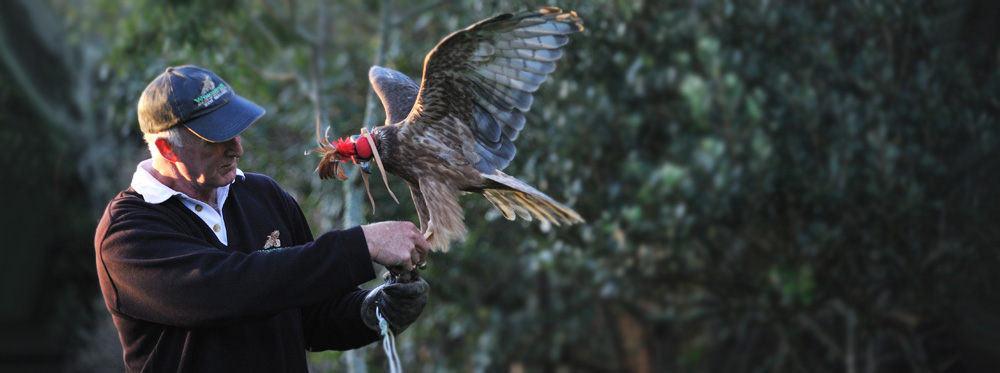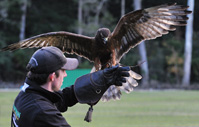
Is Falconry for me?
Falconry / Is falconry for me?
Falconer requirements | Becoming a Falconer

Falconry requires a high commitment of time, resources and skill. The key word here is commitment. Many people like the idea of becoming a falconer; few have the time, patience, knowledge, skill, or commitment to follow through and actually become a falconer. Training a bird of prey to hunt and catch quarry requires understanding the bird, the world it lives in and how it responds behaviourally to it. Above all a falconer is responsible for the welfare of the bird that is in their care, and this is a commitment that should not be taken lightly.
If you can answer "yes" to the following questions, then falconry might be for you.1. Are you genuinely interested in birds of prey and their role in a sustainable environment?
2. Are you prepared to spend at least 12 months researching falconry and talking to other falconers to gain an understanding of what it takes to become an ethical and successful falconer?
3. Are you level-headed and patient with animals?
4. Falconry is a form of hunting and does not involve keeping a bird of prey as a pet or for non-hunting purposes. Are you already a hunter?
5. Catch rates in falconry are low. If numbers are important to you then stick with a shotgun. Are you prepared to spend a significant amount of time and resources for few successful hunts?
6. Falconry requires stability. Do you have a stable living situation (e.g. own your own home)?
7. Falconry requires a significant daily time commitment seven days a week and some careers are not suitable to its practice. Do you have at least two hours per day to care for, train and fly a bird in the field?
8. Do you have access to enough farmland with enough quarry to hunt a bird?
9. Falconry is expensive. Are you prepared to commit the funds required to set up for falconry before you get a bird (estimate $3000)?
10. Butcher's meat and commercial pet food is not a suitable diet for a bird of prey. Do you have a reliable source of suitable food?
11. Falconry can’t be learned in total from a book. Are you prepared to listen to and follow the advice of experienced falconers?
To find out more, please contact the NZ Falconer’s Association at nzfalconry@gmail.com
Which birds of prey are available to NZ falconers?

The swamp harrier is the only bird available to falconers in New Zealand. Recent changes to the schedules of the Wildlife Act allow harriers to be killed without a permit from the Department of Conservation where they are perceived to be causing harm to livestock or conservation values. Because harriers are common and have a low level of legal protection, with a permit from the Department of Conservation their use in falconry is a sustainable use of wildlife consistent with other sustainable uses of common wildlife, e.g. the hunting of native waterfowl.
Although you will see falcons being flown at Wingspan, we do this for advocacy and rehabilitation purposes only. The New Zealand falcon is an absolutely protected and threatened species. As such it is illegal for anybody to hold and train a New Zealand falcon for use in the sport of falconry.
Once you have considered this, if you still feel you have the time, space, resources and commitment to train and hunt with a harrier and are interested in becoming a falconer, we recommend as a first step that you contact the New Zealand Falconer’s Association to ask their advice. They can guide you through best practice husbandry and training techniques ensuring the welfare of your bird and helping you to be successful in maximizing your falconry experience with these magnificent birds.
Part of the joy of becoming a falconer is sharing your experiences and learning from others with the same passion. Join Wingspan. Join the NZFA. Become involved. Talk to us and help us maintain the standards necessary to ensure that everyone can enjoy this unique sport and the birds we love.